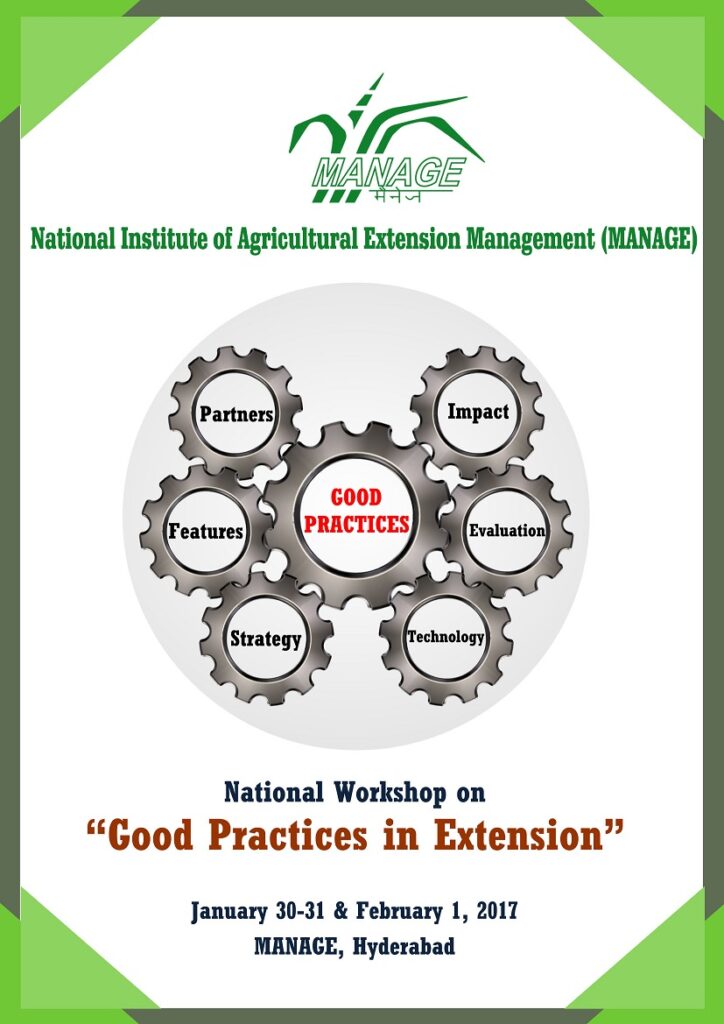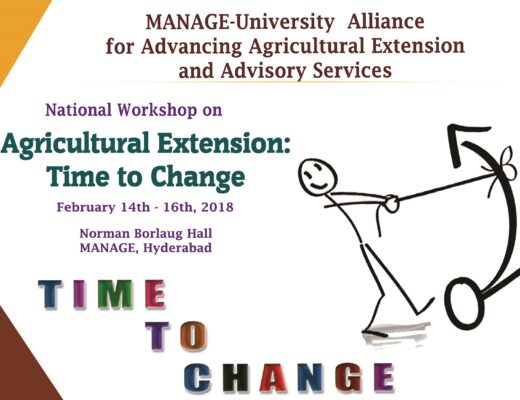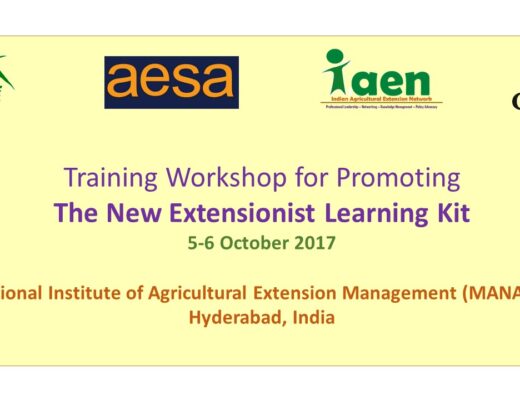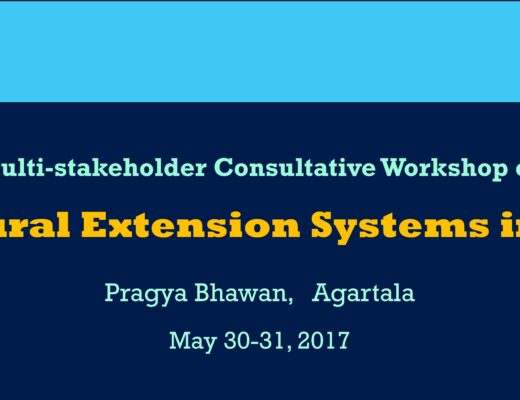National Workshop on Good Practices in Extension
January 30-31 & February 1, 2017
MANAGE, Hyderabad, India
The National Workshop on Good Practices in Extension will take place on January 30-31, & February 1, 2017 at National Institute of Agricultural Extension Management (MANAGE), Rajendranagar, Hyderabad. The link for registration is available on the institute website (www.manage.gov.in).The objectives of the workshop are:
- To invite, discuss and document the good practices in extension
- To create better understanding, and popularization of good practices to other extension functionaries
The workshop aims at providing the participants ample learning opportunities to contribute and share their experience and knowledge and learn from each other. The participants are requested to contribute good practices in extension on any of the following topics:
|
Governance Financial sustainability of extension Accountability mechanism Partnership and pluralism in extension Multi-stakeholder linkage and networking Private extension provisions Farmer-extension-Research linkage Strategy development in extension Decentralized extension Demand driven extension Advisory methods Farmer to farmer extension Community based extension Farmer field school Farmer based organizations Business development services Comprehensive internet platforms ICTs for extension(web portals, mobiles, videos, social media, mApps, IoT, etc.) Mass media in extension Innovation platforms in extension Management information system Policy environment Policy dialogue and extension |
Policy review tools
Advocacy approaches Capacity and management Performance appraisal system Material development for extension Monitoring and evaluation Performance based management Capacity needs assessment Capacity development of field staff Organization culture and staff management Curriculum development Capacity development with ICTs Knowledge management Management advice Cross cutting themes Integrating gender in extension Engaging youth in extension Value chain linkage through extension Climate smart extension Addressing nutrition through extension Extension methods and philosophies Plant health extension Any others |
The participants can provide any kind of input and experience sharing on the above topics during the workshop sessions and experience sharing sessions through;
- Short presentation about a good practice
- Showcase a video in a video corner
- Contribute with any other creative input (group presentation, exhibition, poster, hard talk, theatre, etc.)
Participants
The participants in the program would include extension practitioners of Agriculture, Horticulture, Animal husbandry, Sericulture, Fisheries, faculty from SAUs, Scientists of ICAR, SMS from KVKs, extension functionaries from the private and NGOs, agripreneurs, consultants and farmer representatives from civil society organizations (FBOs, SHGs, associations, etc.).
Application procedure
Context
“Good practices are processes or methodology that represents the most effective way of achieving a specific objective”. Agricultural challenges are diverse and so are the solutions that emerge from various extension approaches, giving rise to promising innovations. And even though exact replication of them might not always help, but having the “recipe” of success might prove successful when tweaked with depending on the situation to get the “best fit”. So, documenting and sharing these “good practices” with diverse range of extension professionals from research scholars to policy makers will help in learning and re-using knowledge.
The “good practices” as techniques, principles, or approaches used in agricultural extension in a “best-fit” manner. Good practices are practice oriented. The aim of proposed workshop is to present approaches and knowledge on good extension practices in concise and understandable format that helps the practitioners to implement the approach. Good practices are evidence based. They have been tested and improved in filed condition and can therefore provide evidence on impacts, strengths and weaknesses, and estimated costs of the approach along with the target group and impact (www.betterextension.org).
Submission of proposal
Participants are requested to submit a proposal about the good practice following the guidelines below:
- Synopsis: Summary of the key points in 200-250 words
- Contact details of author/presenter
- Context: The problem or challenges that was addressed including its nature and scope. A detailed history helps in understanding the problem/challenges in context, highlighting the key factors that led to the decision to develop the extension initiative, including opportunities and partnerships that made the ‘good practice’ possible.
- Good practice: Discuss in detail
- Partners: Identify all the stakeholders including institutions, units, and individuals involved and describe the roles played them in relation to overall initiative.
- Good practice: Describe the goals and outcomes of the practice, its design or characteristic features, and framework selected to evaluate it.
- Implementation: A step step implementation narrative to address any hurdles, distractions, or other expected or unexpected challenges that arose during implementation and how these were overcome.
- Supporting technologies: Describe the supporting technologies used during planning or implementation, their identification and selection procedure, and their importance/impact in the good practice.
- Evaluation and impact: Describe the institutional outcome of the good practice and the evaluation process. To what degree the practice contributed to solving the problem or intended development? How fairly it met the initial goals? Does it ultimately address the problem/challenge?
Case study boxes with beneficiary quotes are to be included. But only add cases or success stories that can be connected to a larger narrative or solution
- Sustainability and scaling up: How viable is the solution? What measures need to be taken to ensure its physical and financial sustainability? What are the steps that need to be followed to suit it for a larger scale?
- Analysis: What were the essential factors (partners, policy, networks, relationship management, resource availability, decision making) leading or contributing to eventual outcomes?
- Lessons learnt: What lessons were learnt in executing the practice?
- Future plans: What are the plans for ongoing development, iteration, integration and growth? On hindsight, what could have been done differently?
- Conclusion: Final thoughts and considerations regarding the practice
- Additional resources: Web links, references, etc.
- Acknowledgement(s), if any.
Timeline for proposal submission
| Submission of draft good practice note | December 25, 2016 |
| Review and feedback on proposal | December 31, 2016 |
| Submission of final good practice note (10-15 pages) | January 15, 2017 |
Workshop Director
Dr. Saravanan Raj
Director (Agricultural Extension)
National Institute of Agricultural Extension Management (MANAGE)
Rajendranagar, Hyderabad – 500030, Telengana, India
e-mail: saravanan.raj@manage.com/saravananraj@hotmail.com
Ph. No.:040-24016693; Mobile: 8465007799
Workshop proposal may be mailed to:
Dr. Suchiradipta Bhattacharjee
MANAGE Fellow
Centre for Agricultural Extension Innovations and Reforms
MANAGE, Rajendranagar, Hyderabad – 500030, Telengana, India
e-mail: suchiradipta@hotmail.com/ suchiradipta.cau@gmail.com
Mobile: 9863715956



